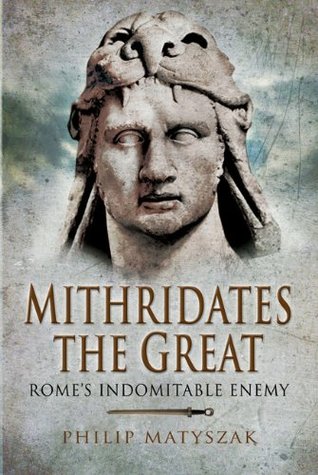More on this book
Kindle Notes & Highlights
Read between
June 24 - June 28, 2024
It was probably at this point that Mithridates, aware of his numerous and powerful enemies, earned his nomination as the world’s first experimental toxicologist. He started taking small doses of poison on a regular basis; both to accustom himself to the taste, and his system to the effects. After a while he had put together a small pharmacopoeia of poisons and antidotes that were known for generations afterwards as ‘Mithridatic potions’.
Mithridates’ alleged immunity to poison might well have saved his life on several occasions, not least because it persuaded potential assassins that poison was not even worth trying.
By contrast, the phalangites had discovered that raising their pikes to between forty-five degrees and vertical managed to deflect a surprising amount of incoming arrows, and they therefore coped with just a minimal shield strapped to a forearm.
As the Romans themselves were later to note with a large degree of respect, Mithridates saw himself not as a victim of Rome but as a rival for mastery; certainly in Asia Minor, and after that, who knows?
way. So why did he decide to challenge what was already the most formidable military power the world had ever known? To answer this question, we must consider the Rome of 89 BC, not what Rome was to become. What Mithridates saw was a state which had grown like a weed across the Mediterranean basin, and which now, like a weed which has outgrown its strength, was toppling under its own weight.
Aquillius’ suffering reached a dramatic end at Pergamum, where Mithridates had him killed with molten gold poured down his throat.
If it was difficult to distinguish between them, Mithridates’ solution was straightforward and breathtakingly inhumane. He would kill them all, Romans and Italians, men women and children, all 80,000 of them.
Nike, the goddess of victory. The goddess was literally a dea ex machina, a goddess from the machine - a statue which, crown in hand, was winched down from the overhead awnings.
The prisoners had been told that their only chance of survival lay in persuading their fellow-citizens to surrender. In a piteous scene the hostages raised their hands in supplication to friends and relatives within the city and pleaded to be saved. They were given the resolute reply from the city’s general that they were in the hands of the enemy and should bear with courage whatever fate awaited them. That fate is unknown, but was probably grim. The unsentimental Mithridates was hardly going to waste scarce supplies on hostages whose purpose had failed. The reason for this literally
...more
Warfare was more damaging than any typhoon for the lands a hostile army passed over.
The strategy of Mithridates is reasonably clear. To win, he had simply not to lose.
Rome did not just rule her conquests, but made them Roman, and the edifice of Rome’s empire was far more stable than Mithridates imagined.


